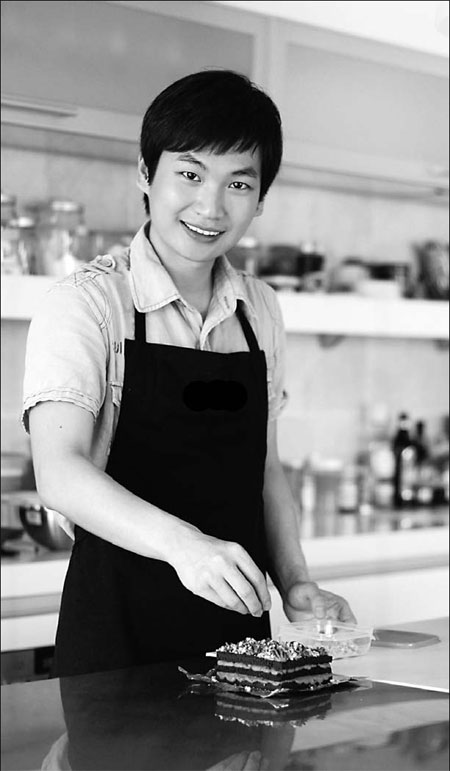Life and Leisure
Holding the apron strings
By Liu Xiangrui (China Daily)
Updated: 2010-09-15 07:53
 |
Large Medium Small |
|
For 26-year-old Liao Di, cooking in the kitchen is really fun. Provided to China Daily |
Cooking for the family has traditionally been the job of women in Chinese society. But increasingly, men are taking control of the wok. Liu Xiangrui reports
After whisking the butter and sugar till the mixture is light and creamy, Liao Di adds the egg whites, before carefully folding in the flour. He then checks the oven temperature. Perfect. In goes the cake tin. Setting the timer to half-an-hour, the 26-year-old IT specialist turns his attention to the icing - a Doraemon face.
When all is done, he gets out his cell phone, snaps away, and rushes to post the pictures on his microblog right away.
The cake is a birthday gift for an orphan at the Children's Welfare Home of Beijing.
Liao, better known online as "Junzhi", is a zhu nan - a man who loves to cook.
Despite the Confucian diktat that "a gentleman should refrain from going near a kitchen", more young Chinese men like Liao are enjoying being zhu nan (literally, boil man).
Not only are they willing to slave for hours over the stove, they are also enthusiastically sharing their triumphs and failures, cheers and tears, with a growing number of online fans.
Traditionally, cooking has been regarded as a woman's job in Chinese society and the term weiqun nan (men in aprons) is often used derisively for Shanghai men, who take up the frying pan more often than men in other parts of the country.
But the term zhu nan carries no such disdain.
"Being a zhu nan can be really fun," says Liao, whose romance with cakes and pastries was sparked in 2005, when he learned that his favorite KFC egg tarts could actually be made at home. Liao has since successfully ventured into making cookies, pies, and other desserts.
He has also authored two bestsellers, winning thousands of followers online.
One of them is his mother, who credits her son for her consummate skills in making sponge cakes and moon cakes.
Although Liao often complains on his Sina blog that he has put on weight despite the hard work involved in all the dough kneading, he says he enjoys baking as it allows his imagination free rein.
He is not the only star zhu nan online. Many others, boasting their own "specialties", regularly post pictures, recipes and critiques of their creations on various cuisine-oriented websites.
According to Tencent, a popular Chinese portal, a recent survey of 30 college students in Guangzhou found that 13 of them - mostly girls - had no idea about cooking.
Although the survey had a small sample, it does reflect the changing roles of women in Chinese society. Unlike their mothers and grandmothers who were bound to the kitchen, women today enjoy more freedom and many aspire for a career, which leaves them with little time in the kitchen.
And it not just their appetites or curiosity that drives today's young men to enter the kitchen; they also do so for romance. Yang Qing, a 30-year-old employee of an IT company in Shanghai, says he enjoys cooking with his wife at the weekends.
Given their busy work week, the couple cherish the little time they get together at the weekend.
"It's not about how well you cook, it's all about with whom you cook," Yang says.
For single men, being able to drum up one or two dishes for the table could well be the way to capturing a woman's heart.
In fact, another poll on qq.com of Tencent earlier this year showed that 82 percent of 26,779 young women surveyed said their dream boyfriend is a zhu nan. In their minds, a husband who can cook makes a good husband.
Qing Peng, an animation producer in Guangzhou, Guangdong province, won the heart of his girlfriend by whipping up banana in hot toffee, which he mastered after tireless online research and several failures.
Qing admits that at first he did fear being ridiculed. "But no one actually did (ridicule)," Qing says. "My family praised me, joking that at least I was unlikely to starve."
Other men become zhu nan to save money on eating out, or out of health concerns.
The fast growing numbers of zhu nan are not only boosting the sale of cookbooks but also redefining age-old gender roles.
"These young men no longer see cooking as a sign of lower status in the family, instead they view it as a way of remaining involved in the family and facilitating greater communication," says Professor Xiong Sidong from Fudan University, Shanghai.
